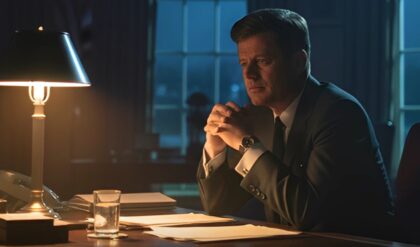In the vast landscape of Hollywood thrillers, some films shine brightly only to fade into obscurity, overshadowed by blockbusters or more heavily marketed releases. One such hidden treasure is Flightplan (2005), a gripping psychological thriller directed by Robert Schwentke. Anchored by a riveting performance from Jodie Foster and a meticulously crafted script by Peter A. Dowling and Billy Ray, Flightplan delivers a suspenseful narrative that keeps audiences on the edge of their seats. Despite its mixed critical reception and underappreciated status, this film is a must-watch for anyone who appreciates taut storytelling, emotional depth, and stellar acting. Here’s why Flightplan deserves a place on your watchlist.
A Compelling Premise Rooted in Paranoia
Flightplan centers on Kyle Pratt (Jodie Foster), a propulsion engineer who boards a transatlantic flight from Berlin to New York with her six-year-old daughter, Julia (Marlene Lawston), and the coffin of her recently deceased husband. The story takes a chilling turn when Kyle wakes from a nap to find Julia missing. As she frantically searches the plane, she’s met with a shocking revelation: no one—neither the passengers nor the crew—recalls seeing her daughter, and there’s no record of Julia ever being on board. What follows is a claustrophobic, high-stakes mystery that blends psychological tension with post-9/11 paranoia, drawing comparisons to Alfred Hitchcock’s The Lady Vanishes (1938).
The film’s premise is deceptively simple yet profoundly unsettling: how could a child vanish mid-flight on a state-of-the-art airliner? This question drives the narrative, creating a locked-room mystery at 30,000 feet. The script cleverly plays with the audience’s perception, making us question whether Kyle is a grieving mother spiraling into delusion or the victim of a sinister conspiracy. This ambiguity is one of Flightplan’s greatest strengths, keeping viewers guessing until the final act.

Jodie Foster’s Tour-de-Force Performance
At the heart of Flightplan is Jodie Foster’s electrifying performance as Kyle Pratt. Foster, a two-time Academy Award winner, brings a raw intensity to the role, portraying a woman whose grief and desperation are palpable. From the moment Kyle realizes Julia is gone, Foster’s performance is a masterclass in conveying escalating panic without tipping into melodrama. Her ability to balance vulnerability with steely determination makes Kyle a compelling protagonist—one who’s both relatable and heroic.
Foster’s portrayal is particularly effective because it grounds the film’s more far-fetched elements. As Kyle races through the plane’s aisles, crawls through maintenance compartments, and confronts skeptical crew members, Foster imbues her with a fierce maternal instinct that resonates deeply. Critics have praised her for elevating the material, with Roger Ebert noting that her “performance as a resourceful and brave woman” is central to the film’s excellence. Even when the script veers into implausible territory, Foster’s conviction keeps the audience invested, making us root for Kyle as she fights to uncover the truth.
A Script That Balances Suspense and Emotion
The screenplay, penned by Peter A. Dowling and Billy Ray, is a standout feature of Flightplan. Originally conceived by Dowling in 1999 as a story about an airport security agent whose son goes missing on a flight, the script was later reworked to focus on a female protagonist, a decision that proved ideal for Foster. The writers also incorporated post-9/11 anxieties, adding layers of tension and paranoia that reflect the era’s heightened fears about air travel.
The script’s strength lies in its pacing and structure. For the first hour, Flightplan is a masterfully paced psychological thriller, building suspense through subtle clues and misdirection. The film toys with the audience’s expectations, using visual cues—like Julia’s absence from certain shots or passengers’ odd glances—to sow doubt about Kyle’s sanity. The dialogue is sharp and naturalistic, particularly in scenes where Kyle’s frustration clashes with the crew’s growing skepticism, led by Captain Rich (Sean Bean) and Air Marshal Gene Carson (Peter Sarsgaard).
While some critics have criticized the film’s final act for its convoluted twists and implausible plot points, the script’s emotional core remains intact. The theme of a mother’s unyielding love for her child anchors the story, making even the more outlandish developments feel earned. The writers also deserve credit for their attention to detail, such as Kyle’s expertise as an engineer, which allows her to navigate the plane’s infrastructure in ways that feel authentic and empower her character.
A Stellar Supporting Cast and Technical Craftsmanship
Beyond Foster, Flightplan boasts a strong supporting cast that enhances its suspenseful atmosphere. Peter Sarsgaard delivers a nuanced performance as Carson, the air marshal tasked with monitoring Kyle. His understated demeanor and ambiguous motives keep viewers guessing about his true role. Sean Bean, often typecast as a villain, is effectively cast against type as the sympathetic yet pragmatic Captain Rich, adding depth to a character who could have been one-dimensional. The ensemble is rounded out by Kate Beahan as flight attendant Stephanie and Erika Christensen as Fiona, both of whom contribute to the film’s tense dynamics.
Director Robert Schwentke, making his Hollywood debut, brings a keen eye for detail and a knack for building suspense. He described Flightplan as a “slow boiling” thriller, with a quieter opening that crescendos into a faster-paced climax. Schwentke’s use of sound design, such as the hum of the plane’s engines or the muffled chaos of passenger reactions, heightens the film’s claustrophobic feel. The production design is equally impressive, with the fictional Elgin E-474 airliner—modeled after the Airbus A380—serving as a character in its own right. The plane’s sprawling interiors, built from scratch, provide a believable setting for the mystery, with nooks and crannies that make Julia’s disappearance plausible.
James Horner’s score complements the film’s tone, blending eerie undertones with driving rhythms that mirror Kyle’s escalating panic. Horner noted that the music was designed to “match the feelings of panic” Kyle experiences, adding emotional weight to key scenes. Together, these technical elements create a polished, immersive experience that elevates the film beyond its genre conventions.
Why Flightplan Remains Underrated
Despite its commercial success—grossing over $223 million worldwide against a $55 million budget—Flightplan has not enjoyed the lasting recognition it deserves. Critics gave it mixed reviews, with a 38% rating on Rotten Tomatoes, often citing the script’s implausible twists and a perceived shift from psychological drama to action-oriented thriller in the final act. Some, like the Association of Professional Flight Attendants, criticized the film’s portrayal of flight crew as unsympathetic or complicit, which led to calls for a boycott.
However, these criticisms overlook the film’s strengths. The plot holes, while noticeable upon reflection, don’t detract from the visceral experience of watching Kyle unravel the mystery. The film’s exploration of grief, trust, and maternal instinct resonates deeply, and its post-9/11 context adds a layer of cultural relevance. Moreover, Flightplan’s ability to keep audiences guessing—whether through its twists or its unreliable narrative—makes it a standout in the thriller genre.
Posts on X reflect a small but passionate fanbase, with users praising the film’s intensity and Foster’s performance. One user described it as “thrilling until you’re exhausted,” while another called it “a must-watch” for its suspenseful plot. These sentiments echo the film’s ability to captivate viewers, even if it hasn’t achieved widespread acclaim.
Why You Should Watch Flightplan
Flightplan is a film that demands your attention. It’s a rare thriller that combines a high-concept premise with emotional depth, driven by a powerhouse performance from Jodie Foster. While it may not be perfect, its flaws are overshadowed by its ability to keep you guessing and its unflinching portrayal of a mother’s determination. Whether you’re a fan of psychological thrillers, Hitchcockian mysteries, or simply great acting, Flightplan offers something special.
So, the next time you’re scrolling through streaming platforms or looking for a movie to watch, give Flightplan a chance. It’s a gripping, underrated gem that deserves to be rediscovered. You won’t just watch it—you’ll experience it, and you’ll likely find yourself thinking about it long after the credits roll. Just don’t be surprised if you double-check your surroundings the next time you board a flight.





